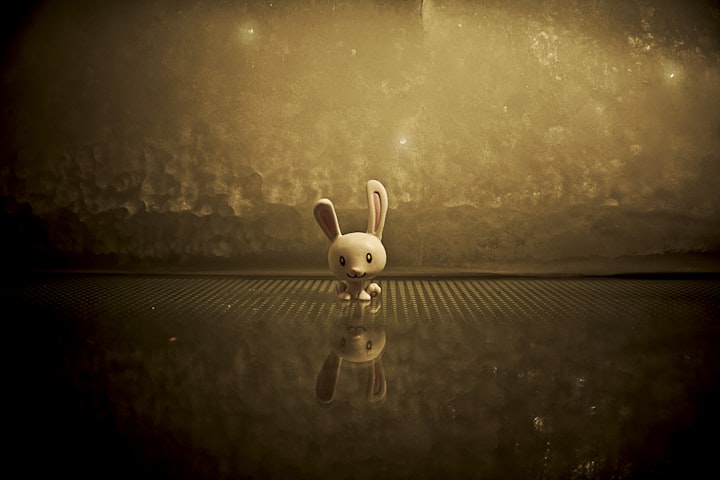We Do Not Control PMDD
Moving from Self-Judgment to Self-Awareness to Self-Acceptance

I write a lot of pieces about PMDD being a call to turn within and begin a journey of healing, the most recent one being "Periods of Misfortune." I know many of you have also come around to this way of thinking. You've used PMDD and all the symptoms it brings as the fuel to take better care of yourself, not just on the physical level, but mental, emotional and spiritual as well. But I know a frustration often remains, "I'm doing everything I can! Why am I still suffering?"
There's this idea that if we apply the tools of self-inquiry, eat all the right foods, take all the best supplements or medications, exercise and get enough sleep, and practice boundary-setting in our relationships that suddenly, our PMDD should completely disappear. Of course, it's what we all would like to be true. We all want to be 100% well right now. We want to never ever again feel that encroaching dysphoria that makes us doubt ourselves, hate those closest to us, and lash out in all directions. There's also the idea out there that if the things we try don't fix things and make our lives perfect again that they aren't worth doing.
But there's a difference between a cure for something which takes it away forever and healing from something which often means it remains part of our lives. As of now, there is still no cure for PMDD. We have to accept that. The best we can do is heal. Taking on healing as our work, as our day to day occupation, is the only real power we have; we have to find a way to still enjoy our lives. If we don't, we'll just spiral downward in our perceived helplessness and grow bitter. No one wants that.
Intellectually, we know that PMDD is just a condition, that it isn't who we are, yet our behavior and how we talk to and about ourselves show all the ways we don't really believe that yet. We still believe deep down that we are somehow flawed and that "this shouldn't be happening to me!" This can seem especially true when we're throwing everything we've got at our symptoms to feel better.
There is a mistaken idea out there that if PMDD doesn't disappear altogether from doing a practice that the practice isn't worth doing... or a treatment worth taking... or that we're not doing it "right." We continue to assign blame... to the disorder, the practice, and/or ourselves. Somebody has to be at fault, right? Pain can make us look for someone or something to blame, but it never really alleviates anything.
We all want to be perfect, beautiful, sweet, loving, vivacious and magnetic all the time. We never want to have a negative thought, feel an uncomfortable emotion, face a difficult challenge. We want to be in touch with our best self; that's a natural desire. But we don't quite understand that nature itself is a wild thing, impossible to shape and control or bend to our will.
Look. We don't control PMDD. PMDD controls PMDD. We control ourselves to the extent our PMDD allows. Some days it's easier than other to recognize how much and where our control lies. Developing our awareness is critical to this.
But just because we develop the ability to see something as it is happening doesn't mean we should be able to change it then and there, if at all. So why are we so hard on ourselves when we can't control what we're going through? It seems many mistake awareness as a means to more skillful self-recrimination. In fact, awareness can and should be a path to self-acceptance. It's not a means to judge ourselves harder or a means to change a hard reality, but it is a means to love ourselves no matter what.
The best we can do with PMDD is to manage it, and the more tools we have at our disposal, the better. Some days, we'll be more successful that others. We have to learn to be okay with that. It is what is. We have to learn to forgive ourselves and, as hard as it is, to even forgive the fact that we have this condition in the first place. It's where true healing begins.
I'm here to tell you, the more we try and fight PMDD, the more we push it away and try to carry on with life as usual as if nothing is happening, the more we resent it, the stronger and bigger it feels. The more we can accept its arrival, breathe through it, and allow it a passage out of us in time, the easier it will go.
I know. Easier said than done. But it can and does get easier with time.
Have you enjoyed what you just read? Be sure to check out my other articles on Premenstrual Dysphoric Disorder. You can also like and follow PMDD Life Support on Facebook. Your kind tips help me to continue building this library of PMDD-specific content.
About the Creator
Cheeky Minx
Cheekyminx writes intimately about PMDD (Premenstrual Dysphoric Disorder) and hosts the Facebook page PMDD Life Support, a place where women with PMDD can find information and inspiration to cope. Your contributions are appreciated!






Comments
There are no comments for this story
Be the first to respond and start the conversation.